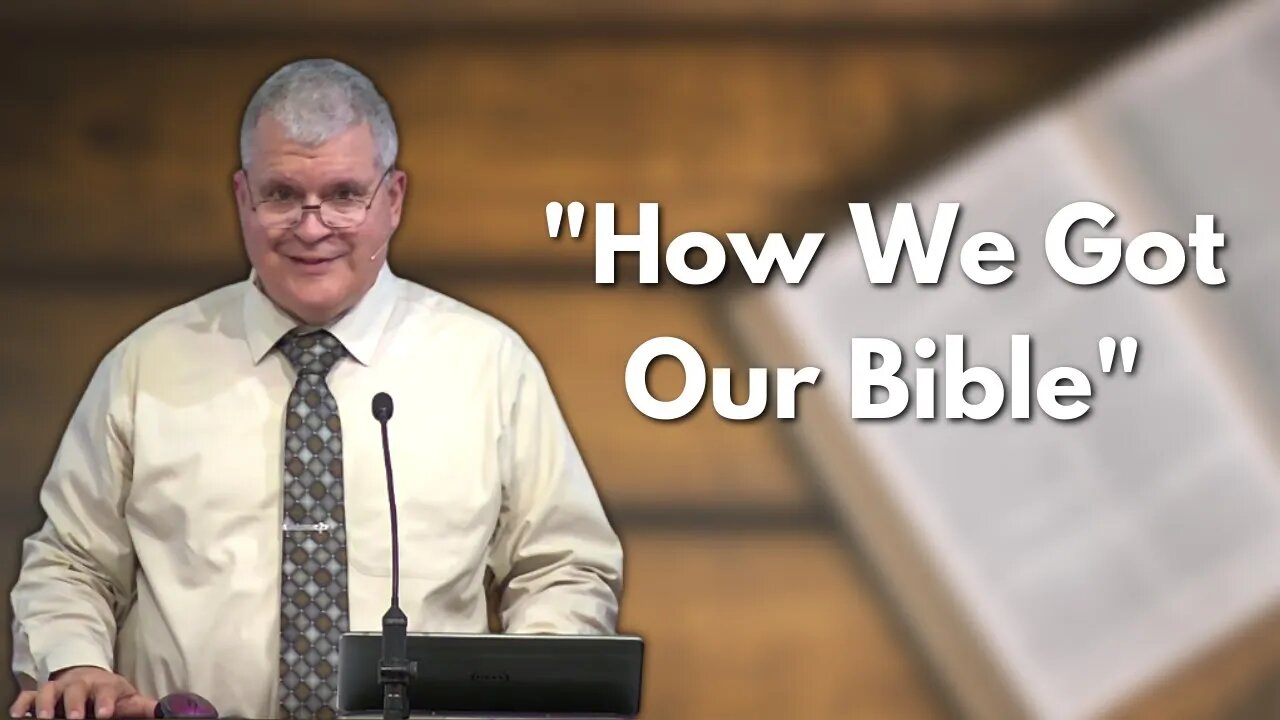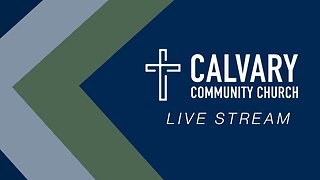Premium Only Content

LIVE - Calvary of Tampa Sunday Evening Service with Dr. Bob Gilbert | How We Got Our Bible Part 2
Calvary Community Church of Tampa LIVE PM Service Service with Dr. Bob Gilbert
------------------------------------------------------------------------------
SUBSCRIBE https://www.youtube.com/c/bibleline
LIKE https://www.facebook.com/biblelinemin
TWEET https://www.twitter.com/biblelinemin
COMMENT ask us a question!
SHARE with all your friends and family
Do you have a Bible question? Send your question to questions@biblelineministries.org!
Support Bibleline - https://www.calvaryoftampa.org/donate/
Bibleline is a ministry of Calvary Community Church in Tampa, Florida and is hosted by Pastor Jesse Martinez.
LIKE THIS? CHECK THESE GUYS OUT:
https://www.youtube.com/c/Northlandchurchstc
(Tom Cucuzza)
https://www.youtube.com/channel/UCdddWVKMcM9c-SjUR1LZTBw
(Jim Scudder)
https://www.youtube.com/c/NorthsideChurchAthens
(Freddie Coile)
https://www.youtube.com/user/biblelinebroadcast
(Yankee Arnold)
https://www.youtube.com/c/TheKeesBoerMinistryChannel
(Kees Boer)
nearly to the bottom of this timeline last Sunday night we've been talking about how we got to have a Bible in our
hand and I do agree with what was said this morning it went down to the bookstore and bought a Bible then that's
good I knew that's how I got my Bible but as I'm one of these continue on with
this but before I do if you have your Bible with you or a Pew Bible the same will work either
one psalm 12.
if you'll turn there first first turn to Genesis chapter
three I'm sorry two verses and if you can't turn to it it's okay
you'll know these verses they're very familiar I want to ask you a question do you believe the Bible
okay so what the Bible says is true and right right Genesis chapter 3 verse 4 says
the serpent said unto the woman ye shall not surely die for God doth know that in
the day you eat thereof then your eyes shall be opened and you shall be as God knowing Good and Evil
that's a lie it's a lie that is accurately recorded
under the inspiration of God the holy spirit in the Bible but it's a lie if all you read was
you shall not surely die and you said that's in the Bible we're good let's go
do whatever we want to do you'd be taking something we call out of context
the context is the best the passage before and after the whole chapter the
book it's in who it's written to who it's written from and the context matters it's really a bad plan to look
at a verse without considering the context now look at psalm 12.
I'm going to mention this you know there are some folks that teach
that if you use any Bible other than the King James Bible God is not going to
bless you we are not in that group we use the King James Bible here we believe
the King James Bible to be the best English translation that's why we use it there are other translations that are
usable there are weaknesses in all of them but some folks who take the extreme on
the other side say you can't be blessed by God if you don't use the King James they have very little
scripture to support their position they like to say that if God gave the
word by inspiration then God preserves the word
I don't know five or six years ago Dr Arnold came into my little office in the back before I moved to my big office and
he asked me of that question he says Mr Gilbert do you believe that God has preserved his word
and he was a serious question to ask her and I was going to be a serious question answerer
and I thought about it and I said Dr Arnold
I believe God has preserved his word I believe it's true but I don't believe
it's biblical I believe a number of things that are true but are not biblical
I believe we have red carpet in this church more or less that's true but it's not biblical it's
not anti-biblical it's just not in the Bible Thou shalt have red carpet in the Calvary Community Church
I believe the idea that God has had his hand in and preserved the word of God as
it's come down to us through the centuries that's what we're studying tonight I think he's involved I think
the overwhelming evidence is God stayed involved but there is no promise in the
Bible about the preservation of the word like there is about the giving of the word by inspiration of God all scripture
is given by inspiration of God I tried to quote that last week and had to get Dr Myers to help me but there is
there is this one verse in psalm 12. that if you read it and pretend it's not
in a context you might get an idea like those folks
that say the King James Bible is the preserved word of God if you only read verse 6 and I'm going
to read verse 6 but then we're going to look at the context verse 6 says the words of the Lord are
pure words as silver tried in a furnace of Earth purified seven times Thou shalt keep
them O Lord Thou shalt preserve them from this generation forever
and you if you don't look at the verses before that and you don't look at the rest of the psalm you might get the idea
that that's a promise from God that he's going to preserve his word
you're misreading some of the pronouns in those two verses because you didn't read the context now
you know how they abuse it but I would like to show you what it actually says and then you can think about it and decide for yourself the psalm begins it
says it's upon shemaneth and if you look at the Scofield note and
follow it over to Psalm 6. there he has a note that says that means on octaves it's an eighth so
this song is played on octave somehow that's what it means it's a musical notation no big deal a Psalm of David
and the psalm begins help Lord help Lord For The Godly Man ceaseth
for the faithful fail from Among The Children of Men we got a shortage of good people
The Godly Man ceases the faithful of failed from among the children of men so
there's these other people around verse two they and this they shows up a couple a number of times here they
the people that we do have they speak vanity everyone with his neighbor
with flattering lips and with a double heart do they speak you can't tell if they're going to say
one thing or the other thing a double tongue speak was forked tongue I think number
three verse 3 says the Lord shall cut off all flattering lips there's judgment coming and the tongue
that speaketh proud things those them those bad guys who have said
with our tongue we will prevail our lips are our own who is Lord over us
there's the bad group of people remember it started off saying the good people are kind of getting thin they're not
enough of them around and these bad people they're just overwhelming and aggressive and bad verse 5 says
it's for the it's the Lord promising to respond here for the oppression of the
poor that's I suppose good people that are not uh getting the getting much help
The Godly Man ceases the faithful for the sighing of the needy God pays
attention when poor people are oppressed when needy people sigh
now will I arise saith the Lord I will set him in safety
from him he's going to take care of the poor and the needy in safety from him
that puffeth at him the one that's talking about who's Lord over us the bad
dude the one that speaks vanity with his neighbor the double-hearted people
and then he throws the Lord has just said in verse 5 I'm going to get up I'm going to arise I'm going to take care of
them I'm going to set him in safety those are the words of the Lord in this psalm in answer to the plea in verse 1 help
Lord and the Lord says I will now will I arise I will said those are the words of
the Lord verse 6 refers to those words the words of the Lord right then right there are pure words as silver tried in
a furnace of Earth purified seven times that verse has to do with what God just
said and it's a good thing God just said it and then in verse 7 we have to think
about who it's talking about Thou shalt keep which means protect or
preserve or guard them who was he saying in verse 5 he was
going to rise up and set in safety the poor and the needy
Thou shalt keep them O Lord Thou shalt preserve them from this and this generation that's the
other people it's not just saying from now on that's not a Time expression so much as from
these Bad Dudes you're going to preserve the poor and the needy the you're going
to preserve them from this nation this generation this wicked bunch
the wicked walk on every side when the vilest men are exalted
in its context I'm pretty sure verse 7 what God is going to protect or keep and
Preserve isn't verse six his words it's verse 5 his poor people his needy people
I know good men men I respect that say I can't see it that way that just says the
words of the Lord You're Gonna he's gonna preserve them I don't think that's the right way to read it so I just thought I'd throw that out at you that's
the only scripture they've got to establish the idea that it's biblical that God preserves his word I think it's
true that God preserves his word but there's nothing in the Bible that says so I hope that's not confusing now we're
going to go on I just wanted to put that out of there in case you are challenged Someday by someone that presents that
and says look at there God preserves this word why are you studying this stuff
well it was given in languages other than English and we're up to 84 30 here
and it mentions on the timeline at the very bottom of Saint Patrick that's what that's a good name to give him the Roman
Catholic Church claims him but he wasn't Catholic he was a missionary
he was a boy that rebelled against his Deacon parents in Scotland and then the
whole village got raided and he was carried away a slave to Ireland the slavers that put him to work feeding
pigs in Ireland were rough and hard and he remembered a bit of what he'd learned
growing up with it in his church but finally he escaped from the slaver and
made his way to the coast on the east side of Ireland and he's praying he says
God I need a way to get off of this island it's a long way across the water
and he saw a boat there were people loading animals on the boat
he says I need a ride they said we're not taking you anywhere he says I can help with the animals and God answered
his prayer and they took him in the boat headed toward Ireland towards Scotland and missed and was swept by a storm all
the way around the bottom of England over to the coast of France and they survived the Shipwreck nearly starved
got ashore he made his way back to Scotland and when he got back to Scotland he was
a changed man he was a believer that knew God answered prayer and he had the
call of God on him he says I'm going to go back to those slave Traders and those Masters
that I had in Ireland and I'm going to give them the gospel I'm going to tell them how to believe in Jesus and so
Patrick went back from Scotland to Ireland just by himself and was preaching and by the end of his life
there were churches all up and down the length of Ireland not Catholic churches Christian churches
his disciples if you will the ones he led to the Lord
a generation later they went back to Scotland to the little island called Iona i-o-n-a
and there established what the Roman Catholics like to call a monastery they
weren't Catholic it wasn't a monastery it was a bible college and a Missionary Training school and out of the mount the
training school in Iona the the followers that started with Patrick and
the founder of the school whose name was colomba they went not just all over Scotland and not just down into England
and Wales but across the channel and to France and you won't believe it but through Switzerland and down into Italy
into Rome itself and there is still a remnant of their Church a remnant of
their missions work in the city of Rome in Italy today these followers of
Columbus who had learned from Patrick so there's a cathedral in Dublin in Ireland
called St Patrick's Cathedral it is not a Roman Catholic place
it's a Protestant Cathedral anyway I just thought that's interesting I like Patrick
this is the latest photograph we've got of Jerome
possibly not a photograph he was born sometime near 342 he died in
320. that's pretty old for those days he was from Rome but he did much of his
life work in Bethlehem he could handle Greek and Latin but he didn't know much
Hebrew the text here says the first Christians wrote their New Testament in Greek and
joined it to the Greek Septuagint translation of the Old Testament the Greek there were a number of
translations of the Old Testament into Greek but later he the common language of the
Common People was Latin not Greek where he was anyway in the western part of the Roman Empire in the eastern part they
still spoke Greek but in the west they needed Latin and only Highly Educated people new Greek
so this classical scholar that is to say he knew the Latin Classics was asked to
compose a complete and accurate translation of the whole Bible in Latin
he worked for 22 years and he went to Bethlehem to do it because I said he was
kind of weak in Hebrew I understand that it's hard but he got with a Jewish rabbi and
managed to get the bible translated from Hebrew to Latin and the New Testament
from Greek to Latin he could handle that part there was already a common Latin Bible
around in North Africa and up in the mountains in the North End of Italy and Southern France and
Switzerland in that area the mountain valleys they called their Latin Bible the Vulgate it was a popular name it
means the common Bible like we call it the authorized King James version that's what it's a you know Publisher's trick
but Jerome said I'm going to call Mine The Vulgate The Vulgate it's the common
Bible it's what everybody's going to use and it kind of worked it became the Bible everybody used
the principal Bible of Western Europe for a thousand years what do you suppose they used over in Greece and in
Byzantium or Constantinople or turkey they use the Greek Bible because that's
what they spoke in that's their birth language they didn't have to have a translation except of the Old Testament
perhaps its words and its distinctive style inspired worship Theology and art until
the 1500s when movable metal type was invented and
put into use by the German Gutenberg the first significant book not not just a
pamphlet or a track but the first real book printed was Jerome's Latin Vulgate
the first book printed was a Bible well around 450 to 600 it took a while
but the Roman Empire falls apart in Britain
folks named angles that's where we get the word English and Saxons
those were kind of Vikings that had gone down to France and then came over to England they overrun Britain
there were already Christians there remember Patrick and all Pope Gregory back in Rome saw a couple
slaves from England in Rome and they were blonde and had blue eyes and he
said they look like Angels what are they called angles huh how about that he
thought it was a good pun and he says we need to send missionaries over because those Christians in
Wales and Scotland and Ireland and England those Christians don't worship
right they were Christians already but they didn't do it the way the Romans wanted
it done so he sent missionaries not to great gain new converts but to mess up
the Christians that were there my point of view around 500 to 900 that's a long time but
back in Israel on the North Shore of the Sea of Galilee
in one town in particular a group of Jewish Scholars and scribes
that's people who know how to write and read they were called the massarites
and they developed a meticulous system of counting words to ensure the accuracy of each copy of
the Hebrew scriptures why were they copying the Hebrew scriptures because they were wearing them out it's not just
the Jewish people anymore the Christians want the Bible and so there's a demand and of course no printing press
they have to be carefully making copies meanwhile back in England
this is where we got our English Bible we're talking about mostly there was a a
monk and kind of a poet this doesn't say it but he made verse
paraphrases of portions of the Bible into Old English
now I don't think there's anybody here not me certainly that can read Old English
the only piece of work I know that's in Old English is Beowulf and if you've ever read Beowulf you've
read a translation from Old English into Modern English that the story Beowulf exists in Old
English kadaman knew the stories of the Bible and for
the people around him that spoke English Old English Anglo-Saxon he made the Bible stories into their
language not verse by verse word by word translation but it was a start it was
the first beginning of the Bible in English around 7 35 that's the year that he died
a great scholar in England here it just says bead most of the time
you see reference to this man he's called the venerable bead because he outlived most of the people of his day
bead b-e-d-e was a monk and a scholar
and he translated at least some of the Bible into the language of the day in
English we don't have any of it left but we do have a biography of his that
was written by a man that was contemporary with him in the biography of the venerable bead it tells the story
of him on his deathbed finishing the English translation of the Gospel of
John right to the end and he had to ascribe writing it for him
and he says is it done he said it's done and then he died so we wish we had that he was making it
for the monks and the regular people who couldn't read Latin they were very uneducated that time of day
we go jumping far what 600 years and the first whole Bible
is translated from Latin into the English of that day 1382
the English of that day is called Middle English you might be able to sort your way
through Middle English it's not just plain as day the original version of what we call the
Canterbury Tales by Jeffrey Chaucer the Canterbury Tales are in Middle English and usually if you read them you read a
translation into Modern English but it was English it was getting closer to what we have today
John Wycliffe this is before the printing press he and his group
he was quite a scholar he was outspoken he didn't shy back from saying what he
thought about the Roman Catholic system that was of Works he said no it's a faith but um
they got the bible translated but they had to do it from Latin
now most people most people that you read about the Wycliffe Bible they say he translated Jerome's Latin Vulgate I
personally think God got involved and he got a hold of the old Latin Bible from the mountains of Switzerland and Italy
and France I think he did and I think he translated that which is much closer to
the right text of the Bible into the Wycliffe translation
but you can't tell really because all the copies that were ever made got bought up by the crown
and well the crown was in of England when the crown was in possession of the Roman Catholic Church under Henry's
daughter Mary and earlier than that as well they were very Roman Catholic Henry VII was Catholic
until it wasn't but people got a hold of these copies of the English Bible
and changed them erased rodian changed them
to read more in agreement with the Vulgate of Jerome so it's hard to tell anymore because
they messed with it in 1408
a law was passed in England it made it illegal to translate the Bible into English
it's against the law what are they afraid of 1455 the book is printed Gutenberg
prints the Latin Bible things are about to bust loose it's like the internet once it's out there you can't stop it
and the books are being printed here's the story about bead 7 35 he died the
monk bead apparently kept his face warm with a big beard he lived in narrow in
the 700s the most renowned Christian scholar of his day called the father of English learning
his writing spanned the whole range of the knowledge of his day he wrote most of his 40 titles in Latin
when there was no written English language for the sake of his fellow monks who did
not know Latin bead prepared Old English that is Anglo-Saxon translations of
portions of the Bible for them he finished translating John's gospel on his deathbed in 735 not even a trace of
his translation survived the destruction of the Viking invasions he's in remembered as the Pioneer who
inspired later efforts now some of bead's books do survive he his his work
is very important for the history of England in the early times why did he translate the Bible into
English so people could read it for themselves here's another photograph
of John wickliff you know I'm teasing myself when I call him photographs it's an artist's rendering
the first translation of the whole Bible into English is named after John Wycliffe an English priest scholar and
diplomat he was a scholar teaching at Oxford John Wycliffe wrote that the Bible is God's
most authoritative statement and a translation is needed so that the humblest person could learn from it
teaching at Oxford inspired other Scholars to translate Jerome's Vulgate and he said into English of their time
this is not what I think but it's what this says this was done finished completed by 1382. and then they've made
copies each copy of their translation had to be written by hand on the fine
leather the animal skin Pages the copies took about 10 months to make
each copy cost a Year's wages it was about 170 of these copies
handwritten copies existing today the translators named their version the Wycliffe Bible because of the
inspirational role John Wycliffe had in bringing it about many Christians honor Wycliffe as a symbol of zeal to spread
the Bible to his many nations and languages as possible
I told you he didn't shy back from saying what he thought about the Roman Catholic system
but he was a friend of a powerful nobleman in England and the nobleman was strong enough to resist even the king of
England and so Wycliffe in his lifetime was not martyred
but politics change after after Wycliffe had been died and buried in the churchyard in his hometown
the king became stronger his nobleman friend died the Roman Catholic pope in
Rome said we've got to get him out of the Hallowed Ground and they ordered it done and the priests
with their their army the military came and dug up John wickliffe's bones out of
the ground at the churchyard and burned them and they took the ashes of his bones and
they strewed it out over the river and somebody said and just like his
Doctrine the ashes went down the narrow River to the bigger River and down to the Thames and out into the narrow sea
and out into the wide ocean and the translation of God's word has gone around the world
you can't you don't win against God
1516. it's printing press time things are being printed there is a scholar in
Paris named Erasmus he happens to be a priest because his family was a bunch of
Scoundrels Erasmus had a wealthy father who died and he was the heir that his
father's brother wanted the money so his father's brother had the boy Erasmus put into a monastery and they
made him a priest and he didn't inherit but he was brilliant in the monastery he
made great use of the library and then they'd sent him because he was such a good student they sent him to the
university in Paris where he spent most of the rest of his life he was a priest but he made a point of
making it known he never ever celebrated the mass he never ever pretended that he could take wine and bread and turn it
magically into the body and blood of Christ he didn't believe that
well he saw Jerome's Latin Vulgate in common use but
he could read Greek and he saw the Greek New Testament and he kept looking back and forth between
the Greek New Testament and the Latin Vulgate and Saiyan
these are not the same these are not the same
and so what he did was publish Greek and Latin next to each other Page
by Page the whole new testament so people could read and study and see what
the Greek said and see that they were being misled by the Latin
that was his intention and he did accomplish that but in doing doing that he made the Greek New Testament
available to other scholars in Germany Martin Luther took the Greek New Testament that
Erasmus and printed and made a Bible in German for the german-speaking people
in Switzerland I mentioned Henry VIII had a daughter
who was Roman Catholic Queen Mary she was persecuting persecuting killing
the Bible teachers and translators in England so they fled they fled to Europe
they fled to Switzerland to survive and in Switzerland they took Erasmus as
Greek New Testament and translated it into English it was called the Geneva
Bible it became very very popular in English that's a few years later but the
Erasmus Greek New Testament made all that possible nine years later William
Tyndall a student also from Oxford translated the New Testament from Greek
his mentor Wycliffe couldn't do it that he did and it got printed in
Germany printed so that you can make many copies and they wouldn't cost a Year's wages and
smuggled into England well the king of England got mad and hired assassins and he was taken in
the Netherlands we'd call it and put in prison and then and then executed for
heresy his prayer at the stake before they strangled him and burned him his prayer
was Lord open the king of England's eyes 15 35 10 years later one of wycliffe's
helpers named Miles Coverdale got the whole English Bible not just the New Testament printed in English
two years later the Matthews Bible named for a pseudonym Thomas Matthew was
printed by John Rogers an exact copy of tyndall's really it was tyndall's work except what Tyndall
hadn't done the Matthews Bible was printed with the
king's permission 1539 there was a Bible called the great Bible why did they call it that because
it was about as about four times as big as the ones that we have in our hands today it was
huge because of it they made a separate lectern in the church there's the Pope
that the preacher preached at and another one where the Bible was attached and they would spend more time listening
to somebody read the Bible than they would listening to a made a message
it was called the great Bible or the chained Bible because they were chained to the church pillars to avoid theft
Henry VIII dies he has a son named Edward Edward is a young teenager and he
only lives for several years and then he dies so Henry's daughter Mary whose
mother was the Spanish princess Roman Catholic Spanish Princess Mary is Roman
Catholic and she Outlaws English Bible versions by Protestants and it says
persecutes Protestant leaders this is where the expression Bloody Mary comes
from there's nursery rhymes about Mary Mary
Quite Contrary that are really a reference to this bloody time in England where Mary was killing people
we go on this is a picture of William Tyndall
Oxford he could speak five languages so well that it was
said of him that didn't matter which language you addressed him in you'd think that he was speaking in his native
language he asked for permission to translate the Bible from Greek and Hebrew and English
was denied he wanted to translate from Greek and Hebrew because those were the languages in which the Bible was written he left
England and translated the New Testament in Germany had it printed thousands of
tyndall's New Testament were smuggled into England Henry VII offered Tyndall safe passage back to England Tyndall
refused to return unless the king approved his translation Henry VII would not in 1536 he was tricked and
imprisoned and burned at the stake his dying words were lowered open the king of England's eyes a year later the
Matthews Bible much of it exactly the same as the Tyndall Bible was printed with the king's permission Tyndall is
called the father of the English Bible because much of the style and vocabulary of the King James version Bible
is traceable to his work they said of the part of the Bible that he translated
90 to 95 percent of it is still what we have in the King James Bible he didn't
do all of the Old Testament but he did the whole new testament he did the pentateuch and several of the historical
books and then he died
1560 I mentioned the Geneva Bible hundreds of people flee to Switzerland to avoid persecution
a new English translation is printed in Geneva and it's like the Scofield reference Bible it's got notes in it
it's got helps in it oh it became so popular I mean tyndall's was good but
this became really popular in England every household pretty much had one and they they used like we used the Scofield
bible they read the notes and it helps it was a good thing it actually took several more than a hundred years before
the King James Bible got more popular than the Geneva Bible in England after it was published
well the king didn't like the Geneva Bible so he had the Bishops put together a
translation it kind of copied from it but didn't have the notes in it whoops I
went past where I meant to go the Roman Catholic Church is paying
attention there's English Bibles coming out there are a whole lot of English Roman Catholic people and they're not
happy with the Vulgate so the church ordered and in these two towns in France
in Reams and in due the English Bible for the Catholic church was done and it
was done just before the King James Bible they changed it they re-edited it
after the King James came out and became so popular to make it more like the King James Bible
1611 you know as the year they finished and caused the King James Bible to be printed 54 Scholars uh one or two of
them died before it was done but basically a great great plan for translation and they used The Bishop's
Bible in Greek and Hebrew text they looked at other things as well they had Luther's Bible and and a variety of
other Bibles and then it mentions 1881 I did that again sorry
1881 there's something called the English revised version it was supposed
to be just an updating of the King James translation
but instead of updating the language they went to an entirely different Greek New Testament text over the objection of
one of the scholars on the committee who was outvoted by Wescott and hort
and so it's based on a different New Testament text and every modern translation since
then has been based on this wrong New Testament text different than the
King James Bible I think and from 1850 to present many new English translations the Dead Sea
Scrolls who discovered the earliest portions of the Old Testament prove remarkable reliability of the
transmission of the Old Testament now less words more pictures this is what stone carving looked like
this is a clay tablet there's a leather thing and those letters don't look
anything like any language I know I think they are called archaic Hebrew but
they exist those are supposed to be those are actual artifacts that exist
from 1500 to 400 BC
this is a little bit of the New Testament that still exists and it's a fragment from John chapter
18. it was copied in Greek on a piece of papyrus in a book
and it says around 8110 to 130. if it was copied in 110 it had to exist
a good while before that so the New Testament dates as a good
study sometime we'll look at that but the Bibles were copied on papyrus
leather sometimes but later Papyrus which is that read in Egypt that makes a
product something like paper a Papyrus codex that is what we would
call a book a bound volume made from sheets folded and sewn together sometimes with a cover and after the
turn of Jesus lifetime they were used more than Scrolls in the Century since
then codexes codex is a book instead of a scroll
fine quality animal skins from calves or antelopes that's called vellum
or sheeps or goats that's called parchment were used for over a thousand years to make copies of the Bible
from 300 to 1400 those are all hand written copies two of the oldest Vellum
copies that exist today are the one in the Vatican library and the sinaitic Codex that's in the British museum in
London Wycliffe Bibles were written by hand on Vellum in the 13 and 1400s some copies
took 10 months to two years to produce and cost a Year's wages the Gutenberg Bible was the first book to be printed
on a printing press with movable metal type in 1455.
then we look back at the Timeline way back in the Old Testament events were written down as early as the 2000 years
before Christ in Hebrew a little bit of Daniels and Aramaic over
centuries in the book of Exodus several times the Lord tells Moses to write in a book
somebody asked the other day and I pointed out Genesis chapter 5 starts out with the words
the book of the generations of Adam
this is not a new idea the idea of writing things down in a book it wasn't just Moses that learned how to
write I wouldn't be surprised if Adam didn't know how to write he knew a lot more than I do about a lot of things
other Old Testament writers inspired by God included leaders Kings and Prophets
together these writings on leather Scrolls and other materials are called the Hebrew scriptures they're called the
Old Testament around 500 BC Ezra who'd returned from captivity in
Babylon a priest and a scribe collected and arranges some of the books of the
Hebrew Bible the Old Testament according to Jewish tradition around 450 BC and
that is not a good picture of Ezra this mentions the Septuagint it mentions
the unusual mythology tradition that said 72
men made it in 70 days and it was done independently and they came out identical
just not right there's some Papyrus plants down in
Egypt can be cut into strips and pressed into make a writing material of it the
Egyptians would write with Reed pens on papyrus product it was a lot like paper the New Testament books are probably
first written down on Papyrus Scrolls later Christians began to copy them on
sheets of Papyrus which are bound and put between two pieces of wood or tablets for covers this form of early
book is called a codex the time of Jesus Jesus quoted the Old
Testament scriptures often he says he did not come to destroy the scriptures but to fulfill them he says
to his disciples these are the words which I spake unto you that all things must be fulfilled which are written in
the law of Moses and in the prophets and in the Psalms concerning me then opened
he their understanding that they might understand the scriptures in those words of Jesus we see reference to the entire
part that we call the Old Testament the law of Moses were the first five books
Genesis Exodus Leviticus Numbers in Deuteronomy the prophets the way the
Jews referred to them were everything from Joshua and judges
through the end of Malachi and job and the Psalms and the others
they just called the writings or they call them the Psalms in Jesus words those are the three parts of the Old
Testament we count 39 books they counted 22 books by lumping them together but
they had the same Old Testament that we did and Jesus referred to it here
I did not refer to those extra writings that were not to be included in the
Bible Matthew Mark Luke John Paul James Peter
and Jude wrote the gospels they wrote history letters they wrote history they wrote letters to
other Christians and they wrote the Revelation between 45 and 100.
the writers quote from all but eight of the Old Testament books these writings in Greek are copied and
circulated so that by about 150 A.D there's wide enough use of them to speak
about the New Testament the New Covenant the book that goes along with the Old Testament
in 90 A.D some Jewish Elders got together in a town called jamnia
and they looked and said this is the book these are the books that we consider the Canon this is the words of
God and it's the 30 they called it the 22 but it was the 39 books it did not
include the Apocrypha and they considered it authoritative that's what the Jewish people all agreed to the
Apocrypha books were known they weren't bad books but they weren't Bible they
were not at the same level as God's word earliest translations
somewhere 200 to 300 it was translated into Latin and Coptic in Egypt and
Syriac in Syria you do remember that a lot of activity up in Antioch of Syria
where they said Paul and Barnabas out there's a little bit of Coptic it
doesn't look that much different from Greek the church fathers accepted the writing
of the gospels and Paul's letters as canonical which is a Greek word Canon
that means the ruler it was referred to a straight piece of Reed called a cane
that could be used for measuring or drawing a straight line and so it measured up if it was canonical
the rule of faith and Truth a scholar in the 400s listed 21 approved New
Testament books eusebius listed 22 accepted books he was an historian in
the 3rd century they were collected and circulated throughout the Mediterranean by the time
of Constantine the Roman Empire legalized Christianity in 313.
by 400 A.D the same 27 New Testament books that we use today had been
accepted by the whole church all the way in the East all the way in the West in
the areas where it was translated into the other languages in Egypt and in Syria and up into the other mountains
and places confirmed by athanasius Jerome Augustine
and three separate Church councils they just referred to it they didn't make the decision they just referred to it these
are the books the 27 books of the New Testament were formally confirmed astronomical by a synod agreed a meeting
of the leaders in Carthage in 397. but for three centuries they'd all been
used by the Church of Christ in all the different cities and it was just recognizing what the people of God had
already recognized now we're getting back into a kind of a
review thing with Jerome here I would mention
this is somewhat repetitive somewhat dry but it gets you a foundation of the idea
where did where did this come from I didn't just it didn't just show up in the bookstore because Oxford decided to
print it it took
many men many lifetimes giving up
what they might have done with their brilliance to just make God's word without changes
safely come down to us today
it's not magic that it's in a leather cover it's in my hand but it is the word of God that was
inspired by God and given to us so that we could read in it the story about Jesus
and know that we have salvation forgiveness of our sins promise of a
home in heaven we finished our study in the Gospel of John this morning in Sunday School
and that's how he ends up he says oh if we were going to write all the books that should be written I don't think the
world would contain it all but these are written that you might know that Jesus is the Christ the son of
God and the believing you might believe you might have life through his name
I'm so glad we have a Bible we call the Holy Bible
the whole thing the word of God it contains Satan's talk too it contains
men's lies but it contains exactly what God wanted it to contain
no less no more we don't have to pray for some
exalted Church leader to stand up and tell us this is what's right and true and this other's not because we've got
it in our hand we are expected to know what we are what do we have
available to us it's our responsibility each one to learn as much as we can
to teach to share the gospel as much as we can
all right you've been very quiet and I appreciate your attention I hope you're I'm not going to disturb you wake you up
I'm going to put this on my hand you know we let the hands represent each
and every one of us and the wallet represents sin why do I have it on my hand because I'm
a sinner I had a problem but Jesus solved the problem before I
was born second Corinthians chapter 5 verse 21 if you could let this hand with the glove represent Jesus Christ it says
he the father made him the son the one who knew no sin to be sin for us that we
might be made the righteousness of God in him
John tells us Jesus was sent by the father so that we could believe in him
and have eternal life the promise of eternal life this makes it make sense the promises to
anyone who will believe in Jesus let's pray together Father in Heaven as we
close this study tonight we think we could have done a better job
but we pray that as far as there if there's any folks listening who have not trusted in Jesus that they will understand that most important thought
that Jesus is the savior and we can believe in him and we can be
safe we can be sure of it because of the word of God but we can believe in him and we'll be safe
not because we know Hebrew or Greek but because we know Jesus if anybody's listening that's never
believed in him we pray father they would do so right now and thank you for these folks who listen
so patiently in Jesus name amen oh
-
 1:03:35
1:03:35
BibleLine
16 days agoCalvary Community Church - Live Stream
501 -

Glenn Greenwald
5 hours agoGlenn Reacts to News of the Week; Plus: Audience Q&A | SYSTEM UPDATE #443
42.6K24 -
 LIVE
LIVE
Dr Disrespect
10 hours ago🔴LIVE - DR DISRESPECT - PUBG - 5 CHICKEN DINNERS CHALLENGE
4,026 watching -
 LIVE
LIVE
SynthTrax & DJ Cheezus Livestreams
10 hours agoFriday Night Synthwave 80s 90s Electronica and more DJ MIX Livestream THE GREAT EDO WARS OF 2067 Edition
233 watching -
 LIVE
LIVE
RalliedLIVE
1 hour ago $0.02 earnedWarzone Domination w/ Ral
316 watching -
 1:10:17
1:10:17
Sarah Westall
3 hours agoWorld Leaders Increasingly Display Panic Behavior as Economic Change Accelerates w/ Andy Schectman
11.4K1 -
 41:57
41:57
BonginoReport
5 hours agoProtecting Kids From WOKE Ideology in School (Ep. 35) - Nightly Scroll with Hayley Caronia -04/25/25
63.7K21 -
 1:15:07
1:15:07
Kim Iversen
1 day agoThe Left Is Dead — What And Who Will Rise From the Ashes?
64.6K55 -
 LIVE
LIVE
Joker Effect
18 minutes agoYOU DON'T UNDERSTAND FREEDOM OF SPEECH IF THIS MAKES YOU MAD!
278 watching -
 LIVE
LIVE
SpartakusLIVE
3 hours agoFriday Night HYPE w/ #1 All-American Solo NUKE Hero
64 watching